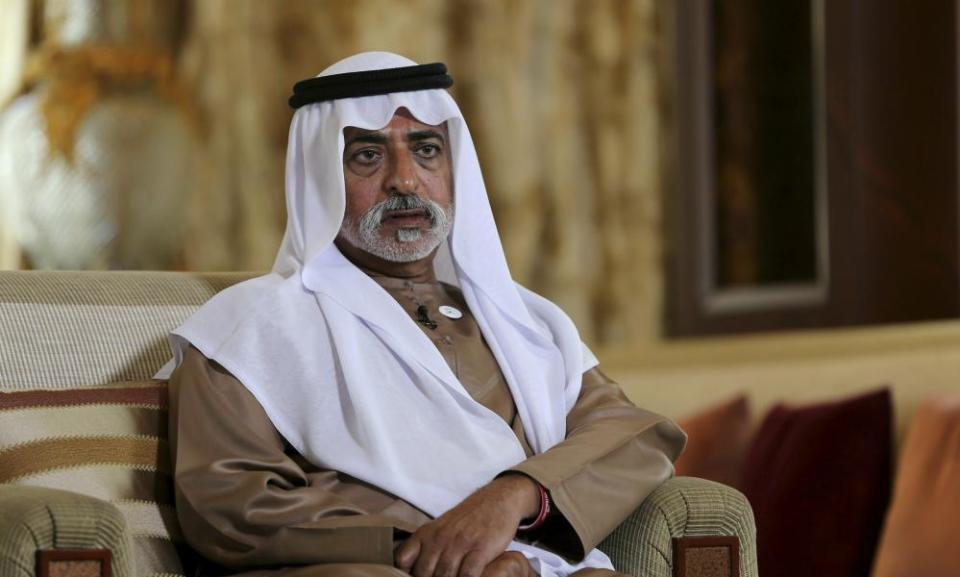Gulf royal accused of sexual assault must go, says Hay literature festival

Hay literature festival will not return to Abu Dhabi until a senior Gulf royal is removed from his post as the United Arab Emirates’ minister of tolerance, after the curator of the inaugural Hay festival in the country accused him of sexual assault.
Caitlin McNamara was the curator of the first sister festival in Abu Dhabi, which was feted as an opportunity to promote freedom of expression, human rights and women’s rights in the UAE. In an interview with the Sunday Times, she accused Sheikh Nahyan bin Mubarak Al Nahyan of sexually assaulting her on 14 February, 11 days before the festival began.
The four-day festival, which was attended by authors including Nobel laureate Wole Soyinka, Jung Chang and Bernardine Evaristo, was funded by the UAE’s ministry of tolerance, headed by Nahyan. It went ahead as planned after McNamara reported the alleged assault to festival organisers, as she wanted it to continue.
Related: As Hay festival opens in the UAE, authors condemn free speech abuses
McNamara alleges that she was invited to an evening meeting with the 69-year-old royal, which she thought would be an opportunity to discuss the festival and the ongoing cases of detained authors in the UAE. Instead, she was taken to a villa on a private island, where she alleges Nahyan sexually assaulted her. She reported the alleged assault to embassy staff and festival staff immediately.
Nahyan has denied the allegations through London libel lawyers Schillings, who said: “Our client is surprised and saddened by this allegation, which arrives eight months after the alleged incident and via a national newspaper. The account is denied.” When asked about the allegation by the Associated Press, the UAE’s foreign ministry said it would not comment on personal matters.
Returning to the UK just before the coronavirus lockdown, McNamara was interviewed by police on 3 July. She is now seeking legal redress through the Crown Prosecution Service, which has been sent a formal opinion by lawyers acting for McNamara pro bono. However, McNamara says that a delay in the CPS verdict, which was expected last month, prompted her to take her case to the media.
On Monday night, Caroline Michel, chair of Hay festival told the Guardian: “The Hay festival board has been very clear that it would not return to Abu Dhabi whilst Sheikh Nahyan bin Mubarak Al Nahyan remains in post. Our exchanges with the ministry of tolerance have been limited while awaiting the outcome of the legal avenues being explored by Caitlin … We have no plans to return.”
The Hay festival will continue to pay for counselling for McNamara, who remains an employee there. When asked if the festival would introduce new safety measures for staff working overseas, Michel said the festival was “working hard to make sure every possible lesson is captured” from McNamara’s case.
There has long been a strain between the UAE government and its human rights record, and the international cultural events held there. Concerns had been raised with Hay festival founder Peter Florence since the Abu Dhabi festival was first announced. The day it launched, Stephen Fry – the festival’s president – joined more than 40 public figures and organisations castigating the UAE government for “promoting a platform for freedom of expression, while keeping behind bars Emirati citizens and residents who shared their own views and opinions”.
On Tuesday, Baroness Helena Kennedy QC, a frequent speaker at Hay who has taken up the case, said the CPS could classify the case as torture.
“The parameters of torture have been enlarged in recent cases through recognition that cruel and inhumane treatment can also be psychological or involve sexual abuse,” she told the Times.
The Hay festival is traditionally held in the small Welsh town of Hay-on-Wye each year, but was cancelled in March due to the coronavirus. It has held sister festivals in international cities including Cartagena, Arequipa and Nairobi.

